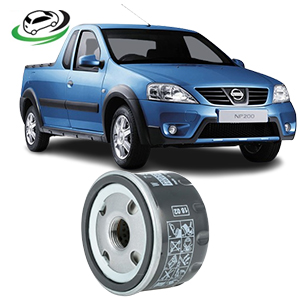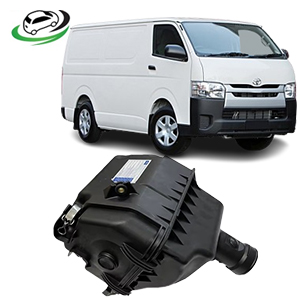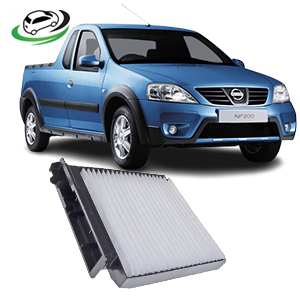-10%
Get Nissan Pick Up NP200 Cabin Filter ADN12506
The cabin air filter is a crucial component of a vehicle’s ventilation system, designed to enhance the quality of air entering the passenger compartment. By filtering out dust, pollen, pollutants, and other contaminants, the cabin air filter plays a vital role in ensuring a comfortable and healthy driving environment. This detailed exploration will cover the structure, function, types, importance, maintenance, and symptoms of a failing cabin air filter.
Structure of the Cabin Air Filter
The cabin air filter consists of several key components that work together to purify the air:
- Filter Media: The core of the cabin air filter, this material is typically made from pleated paper, activated carbon, or synthetic fibers. The filter media is designed to trap particles of various sizes, ensuring that only clean air enters the cabin.
- Frame: The filter media is encased in a sturdy frame, usually made of plastic or cardboard. The frame provides structural support, ensuring the filter maintains its shape and fits securely within the housing.
- Sealing Gasket: This rubber or foam gasket lines the edges of the filter. It creates a seal between the filter and the housing, preventing unfiltered air from bypassing the filter.
- End Caps: In some designs, the ends of the filter media are sealed with caps to enhance structural integrity and ensure a proper fit within the filter housing.
Function of the Cabin Air Filter
The primary function of the cabin air filter is to improve the air quality inside the vehicle. Its key functions include:
- Contaminant Removal: The cabin air filter captures dust, pollen, mold spores, soot, and other airborne particles, preventing them from entering the cabin. This is particularly important for individuals with allergies or respiratory issues.
- Odor Reduction: Many cabin air filters are equipped with activated carbon, which helps absorb unpleasant odors from the outside environment, such as exhaust fumes, industrial pollutants, and other noxious smells.
- Protection of HVAC System: By filtering out debris and contaminants, the cabin air filter protects the vehicle’s heating, ventilation, and air conditioning (HVAC) system from clogs and damage, ensuring efficient operation.
- Enhanced Visibility: Clean air contributes to better visibility by reducing fogging on windows. When the HVAC system operates efficiently, it helps maintain a clear view, especially in adverse weather conditions.
- Improved Comfort: A clean cabin air filter enhances the overall comfort of passengers by providing fresh, clean air, making for a more enjoyable driving experience.
Types of Cabin Air Filters
Cabin air filters come in various types, each offering unique features and benefits:
- Standard Particle Filters: These filters are designed to capture larger particles, such as dust and pollen. They provide basic protection against airborne contaminants and are commonly used in standard vehicles.
- Activated Carbon Filters: These filters contain activated carbon, which not only captures particles but also absorbs odors and harmful gases. They are ideal for urban driving conditions where pollutants are more prevalent.
- HEPA Filters: High-Efficiency Particulate Air (HEPA) filters are capable of trapping very small particles, including allergens and fine dust. They offer superior filtration and are often recommended for allergy sufferers.
- Electrostatic Filters: These filters use an electrostatic charge to attract and capture particles, improving filtration efficiency. They are reusable and can be washed, making them an eco-friendly option.
- Bio-Functional Filters: Some advanced cabin air filters are treated with antimicrobial agents to inhibit the growth of bacteria and mold. These filters are beneficial in preventing musty odors and improving overall air quality.
Importance of Cabin Air Filters
The cabin air filter is vital for several reasons:
- Health Benefits: By filtering out allergens and pollutants, the cabin air filter helps protect the health of passengers, especially those with allergies, asthma, or other respiratory conditions. Clean air can significantly improve overall well-being.
- Enhanced Comfort: A well-functioning cabin air filter contributes to a more comfortable driving experience by ensuring that the air inside the vehicle is fresh and free from unpleasant odors.
- Protection of HVAC System: By preventing dust and debris from entering the HVAC system, the cabin air filter helps maintain its efficiency and longevity, reducing the risk of costly repairs.
- Improved Visibility: Clean air helps prevent fogging on windows, enhancing visibility and safety, especially in humid or rainy conditions. This is particularly important for maintaining a clear line of sight while driving.
- Increased Resale Value: Regular maintenance of the cabin air filter can contribute to the overall cleanliness and condition of the vehicle. A well-maintained interior can enhance resale value and attract potential buyers.
Maintenance of Cabin Air Filters
Regular maintenance of the cabin air filter is essential for optimal performance:
- Replacement Schedule: Follow the manufacturer’s recommendations for replacing the cabin air filter. Typically, it should be replaced every 12,000 to 15,000 miles or at least once a year, depending on driving conditions.
- Visual Inspection: Periodically inspect the cabin air filter for dirt and debris. If it appears dirty or clogged, it should be replaced, even if it hasn’t reached the recommended mileage.
- Driving Conditions: If you frequently drive in urban areas with high pollution, or in dusty conditions, consider replacing the cabin air filter more often to ensure optimal air quality.
- Professional Check-ups: During routine vehicle maintenance, ask your mechanic to check the condition of the cabin air filter. They can provide insights into whether it needs to be replaced based on its condition.
- Seasonal Changes: Consider replacing the cabin air filter at the beginning of each season, especially before the summer and winter months when the HVAC system is used more frequently.
Symptoms of a Failing Cabin Air Filter
Several signs can indicate that the cabin air filter is failing or needs replacement:
- Reduced Airflow: If you notice a decrease in airflow from the HVAC system, it may be a sign that the cabin air filter is clogged and restricting air passage.
- Unpleasant Odors: Persistent bad odors in the cabin, such as musty smells or exhaust fumes, can indicate a contaminated cabin air filter that needs to be replaced.
- Increased Dust Accumulation: If you notice more dust settling inside the vehicle, it may indicate that the cabin air filter is no longer effectively capturing particles.
- Frequent HVAC System Issues: If the HVAC system is frequently experiencing problems, such as unusual noises or inefficiency, it could be due to a clogged cabin air filter impacting system performance.
- Allergy Symptoms: An increase in allergy symptoms among passengers, such as sneezing, coughing, or nasal congestion, may indicate that the cabin air filter is not adequately filtering airborne allergens.
Conclusion
The cabin air filter is an essential component of a vehicle’s ventilation system, significantly impacting the quality of air inside the passenger compartment. By filtering out dust, pollen, pollutants, and unpleasant odors, the cabin air filter enhances passenger comfort and health. Regular maintenance, including timely replacement and visual inspections, is crucial for optimal performance and air quality. Understanding the importance and function of the cabin air filter empowers vehicle owners to make informed decisions about their vehicle’s maintenance, ensuring a pleasant and safe driving experience.
Follow us on Facebook for more parts.



